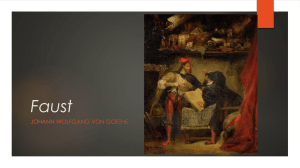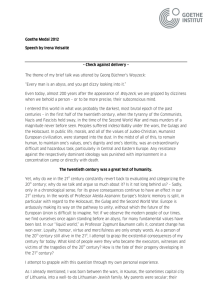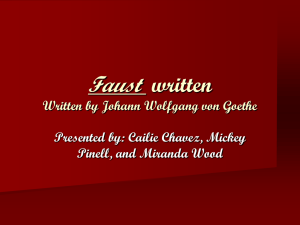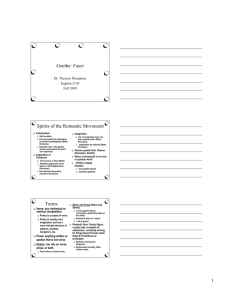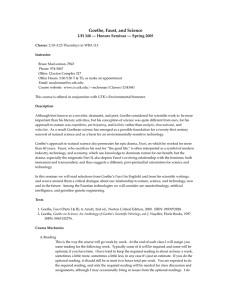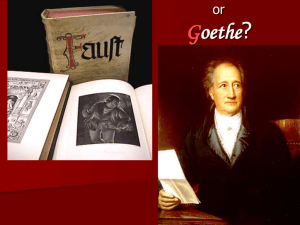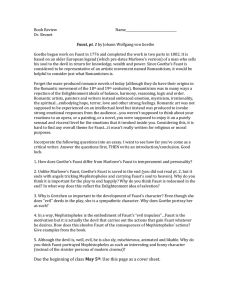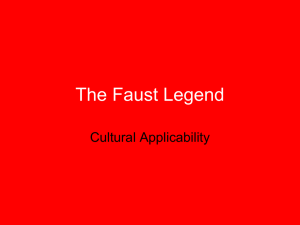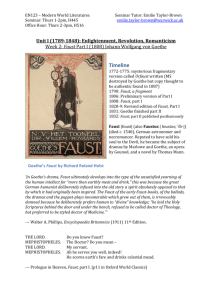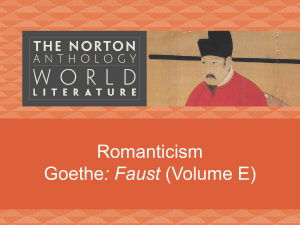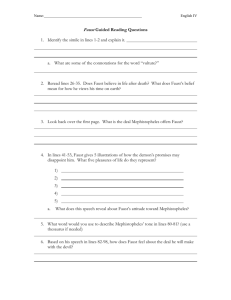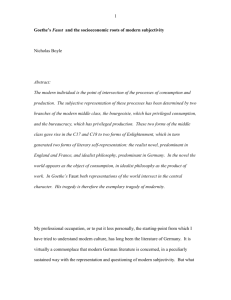CIVILIZATION SEQUENCE 203
advertisement
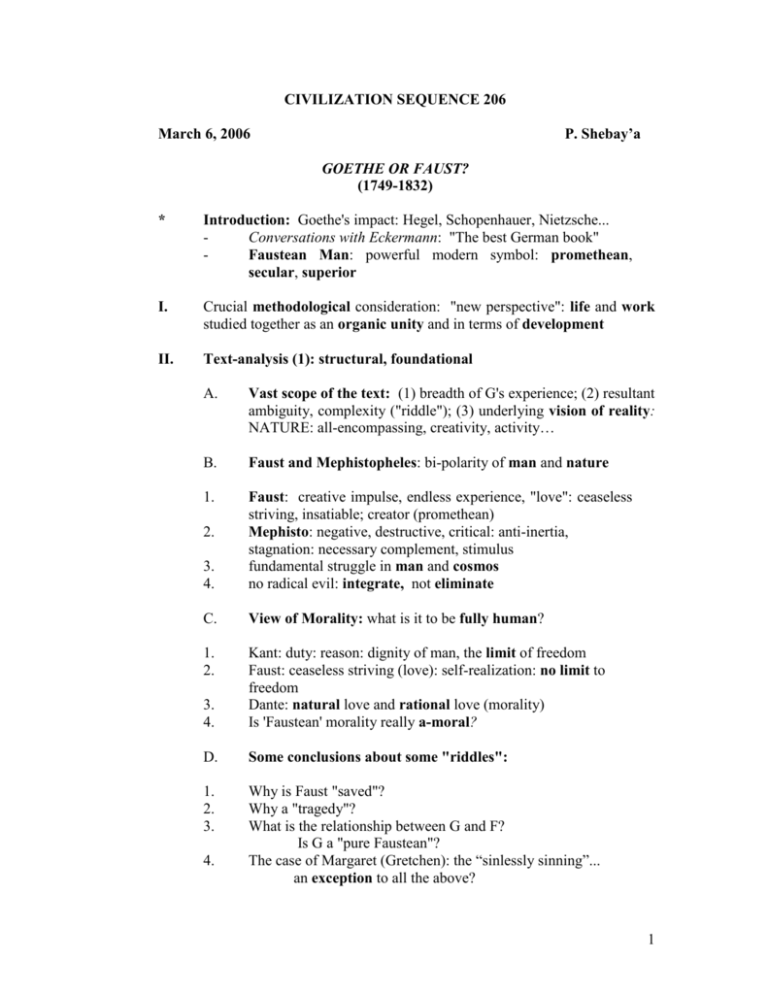
CIVILIZATION SEQUENCE 206 March 6, 2006 P. Shebay’a GOETHE OR FAUST? (1749-1832) * Introduction: Goethe's impact: Hegel, Schopenhauer, Nietzsche... Conversations with Eckermann: "The best German book" Faustean Man: powerful modern symbol: promethean, secular, superior I. Crucial methodological consideration: "new perspective": life and work studied together as an organic unity and in terms of development II. Text-analysis (1): structural, foundational A. Vast scope of the text: (1) breadth of G's experience; (2) resultant ambiguity, complexity ("riddle"); (3) underlying vision of reality: NATURE: all-encompassing, creativity, activity… B. Faust and Mephistopheles: bi-polarity of man and nature 1. 3. 4. Faust: creative impulse, endless experience, "love": ceaseless striving, insatiable; creator (promethean) Mephisto: negative, destructive, critical: anti-inertia, stagnation: necessary complement, stimulus fundamental struggle in man and cosmos no radical evil: integrate, not eliminate C. View of Morality: what is it to be fully human? 1. 2. 3. 4. Kant: duty: reason: dignity of man, the limit of freedom Faust: ceaseless striving (love): self-realization: no limit to freedom Dante: natural love and rational love (morality) Is 'Faustean' morality really a-moral? D. Some conclusions about some "riddles": 1. 2. 3. Why is Faust "saved"? Why a "tragedy"? What is the relationship between G and F? Is G a "pure Faustean"? The case of Margaret (Gretchen): the “sinlessly sinning”... an exception to all the above? 2. 4. 1 III Text-analysis (2): developmental approach: in search of Goethe's real views of man and morality * Three-stage evolution: A. URFAUST: Storm and Stress:'romantic': 1773-75 1. 2. 3. B. From URFAUST to "Fragment” to FAUST I 1. 2. 3. 4. 5. 6. C. anti-romantic: strict "classicist": noble simplicity and tranquil grandeur; lofty themes and a tireless harmony of soul: WEIMAR, 1775 1786:"fateful" trip to ITALY: discovered the classics: rebirth 1788:return to WEIMAR: strict "classicist" mellowing; publishes URFAUST minus "passionate" ending (I: 122-end): a "Fragment", 1790 1797-1806: further work on F I: "Prologue in Heaven" anti-Faustean: hexenprodukt: "Farewell", 1800 published F I, 1808: returned ending FAUST II 1. 2. 3. D. anti-Wagner:'inert' book-knowledge insatiable appetite for 'feeling' and 'experience' ends with "Margaret (Gretchen) tragedy" 1825-1831. classicist: classic: classic-romantic as final position. Helen, 1797: Helena. Classic-Romantic Phantasmagoria. Interlude to Faust, 1825. (II:124 -133) back to beginning... final break-through 1831: end of play... published 1832 Textual illustrations of the development in G's attitude beyond the "Pure Faustean" (romantic). 1. 2. 3. 4. 5. 6. 7. 8. 9. heaven: beginning and end: classic symmetry, order, clarity, natural love Prologue in Heaven: "I will soon lead him into clarity"; "man errs as long as he strives" F II opening scene: healing: break with S & S Poets and the Vampire (II:23): unlimited experience Homunculus-Mephisto (II: 72-76) Classical (vs. Romantic) Walpurgis Night Helen-scenes (II:151ff.): wedding of classic with romantic Arcadia (II:163ff): Euphorion: the fate of pure romanticism Act V: ambiguity and irony: Lynceus' speech (16lines)(II:214) 2 E. Further conclusions about "riddles" 1. 2. Why is F saved? the 'classic' completes the 'romantic' Is G a convinced Faustean? . need consider whole play . G's view of morality: romantic vitality and classic form, self-limitation, clarity . compare with Kant: more place for feeling etc. . compare with F: more place for reason, order etc. 3. How G is not F: . two types of striving: absolute and conditional . insatiability: practically impossible, creatively wrong . creativity and serenity: not incompatible __________________________________________________________________ * Nietzsche: "A Homer would have created no Achilles, a Goethe no Faust, had Homer been an Achilles or Goethe a Faust." (Genealogy. III, sec 4) * Faust's revenge: The independent life of the poetic creation 3
